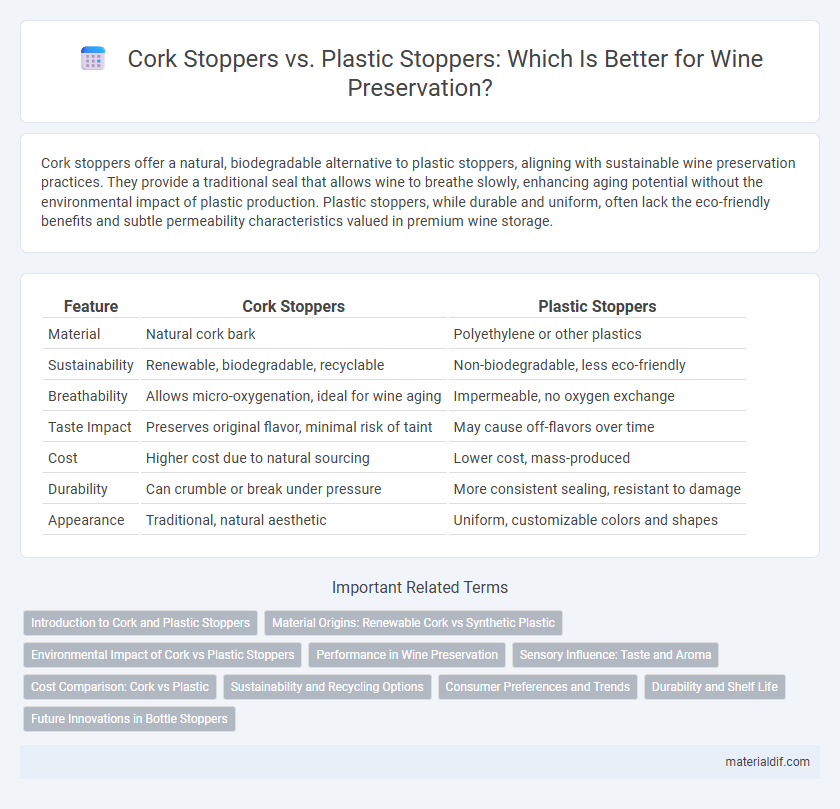Cork stoppers offer a natural, biodegradable alternative to plastic stoppers, aligning with sustainable wine preservation practices. They provide a traditional seal that allows wine to breathe slowly, enhancing aging potential without the environmental impact of plastic production. Plastic stoppers, while durable and uniform, often lack the eco-friendly benefits and subtle permeability characteristics valued in premium wine storage.
Table of Comparison
| Feature | Cork Stoppers | Plastic Stoppers |
|---|---|---|
| Material | Natural cork bark | Polyethylene or other plastics |
| Sustainability | Renewable, biodegradable, recyclable | Non-biodegradable, less eco-friendly |
| Breathability | Allows micro-oxygenation, ideal for wine aging | Impermeable, no oxygen exchange |
| Taste Impact | Preserves original flavor, minimal risk of taint | May cause off-flavors over time |
| Cost | Higher cost due to natural sourcing | Lower cost, mass-produced |
| Durability | Can crumble or break under pressure | More consistent sealing, resistant to damage |
| Appearance | Traditional, natural aesthetic | Uniform, customizable colors and shapes |
Introduction to Cork and Plastic Stoppers
Cork stoppers, harvested from the bark of cork oak trees primarily found in Portugal and Spain, are a natural and renewable resource known for their elasticity and impermeability, making them ideal for sealing wine bottles. Plastic stoppers, made from various polymers such as polyethylene or bioplastics, offer consistent sealing properties and resistance to contamination but lack the natural breathability of cork. Both types serve as effective closures in the beverage industry, with cork preferred for traditional wine aging and plastic valued for cost-efficiency and uniformity.
Material Origins: Renewable Cork vs Synthetic Plastic
Cork stoppers derive from the bark of the cork oak tree, a sustainable and renewable natural resource harvested without harming the tree, making them an eco-friendly choice for sealing bottles. In contrast, plastic stoppers are typically made from synthetic polymers derived from non-renewable fossil fuels, contributing to environmental pollution and higher carbon footprints. The renewable origin of cork supports biodiversity and carbon sequestration, while plastic manufacturing relies on energy-intensive processes and generates plastic waste impacting ecosystems.
Environmental Impact of Cork vs Plastic Stoppers
Cork stoppers are biodegradable and sustainably harvested from cork oak trees, significantly reducing environmental impact compared to plastic stoppers, which are derived from petroleum and contribute to non-biodegradable waste in landfills and oceans. Cork production supports biodiversity in cork oak landscapes and acts as a carbon sink, whereas plastic stoppers generate greenhouse gas emissions during manufacturing and disposal. Choosing cork stoppers promotes a circular economy and reduces pollution, aligning with eco-friendly packaging practices.
Performance in Wine Preservation
Cork stoppers provide superior oxygen regulation, allowing wine to age gracefully while preserving its aroma and flavor complexity. Plastic stoppers often lack the micro-oxygenation properties, which can lead to premature oxidation and diminished wine quality. Cork's natural elasticity ensures a tight seal, preventing leakage and maintaining the wine's integrity over time.
Sensory Influence: Taste and Aroma
Cork stoppers preserve wine's natural aroma and taste by allowing micro-oxygenation, enhancing complexity and bouquet, whereas plastic stoppers tend to create a sealed environment that may trap unwanted odors and diminish flavor development. The porous nature of cork enables subtle breathing, preventing oxidation while maintaining the wine's sensory integrity, a factor crucial for discerning palates. Plastic stoppers often lack this breathability, risking the retention of synthetic flavors that can compromise the wine's authentic sensory profile.
Cost Comparison: Cork vs Plastic
Cork stoppers generally have a higher upfront cost compared to plastic stoppers due to the natural harvesting and processing of cork bark from cork oak trees. Plastic stoppers offer a more affordable option for large-scale bottling, often costing 30-50% less than cork. However, cork's durability and biodegradability provide long-term value despite the initial expense.
Sustainability and Recycling Options
Cork stoppers offer a sustainable solution due to their natural, biodegradable properties and the cork oak tree's ability to regenerate after harvesting, making cork harvesting environmentally friendly in Cork's local economy. In contrast, plastic stoppers, often made from non-biodegradable polymers, present recycling challenges and contribute to long-term landfill waste. Cork recycling programs in Cork facilitate the repurposing of used corks into products like flooring and insulation, enhancing circular economy benefits compared to the limited recycling infrastructure for plastic stoppers.
Consumer Preferences and Trends
Cork stoppers remain favored by eco-conscious consumers due to their natural biodegradability and heritage association with premium wines, while plastic stoppers appeal to those prioritizing cost-efficiency and consistency in sealing. Recent market trends show a growing shift toward sustainable packaging, boosting demand for cork in the wine industry despite the rise of synthetic alternatives. Consumer preference data from 2023 indicates that 62% of wine buyers associate cork with higher quality and tradition, influencing purchasing decisions in key markets like Europe and North America.
Durability and Shelf Life
Cork stoppers in Cork exhibit superior durability due to their natural elasticity, allowing them to maintain a tight seal and prevent oxidation for decades. Plastic stoppers, while resistant to moisture and impact, often degrade faster and may compromise the shelf life of products within five to ten years. The organic composition of cork enhances long-term preservation, making it the preferred choice in high-quality wine and spirits bottling.
Future Innovations in Bottle Stoppers
Future innovations in bottle stoppers in Cork emphasize sustainable materials and enhanced sealing technology to reduce environmental impact and improve wine preservation. Cork stoppers, sourced from the renewable bark of cork oak trees native to the region, continue to evolve with improved sterilization and micro-agglomerated options enhancing performance. Plastic stoppers are being re-engineered with biodegradable polymers and advanced sealing features, though Cork's expertise positions cork-based solutions as the preferred eco-friendly choice for premium wine bottling.
Cork Stoppers vs Plastic Stoppers Infographic

 materialdif.com
materialdif.com